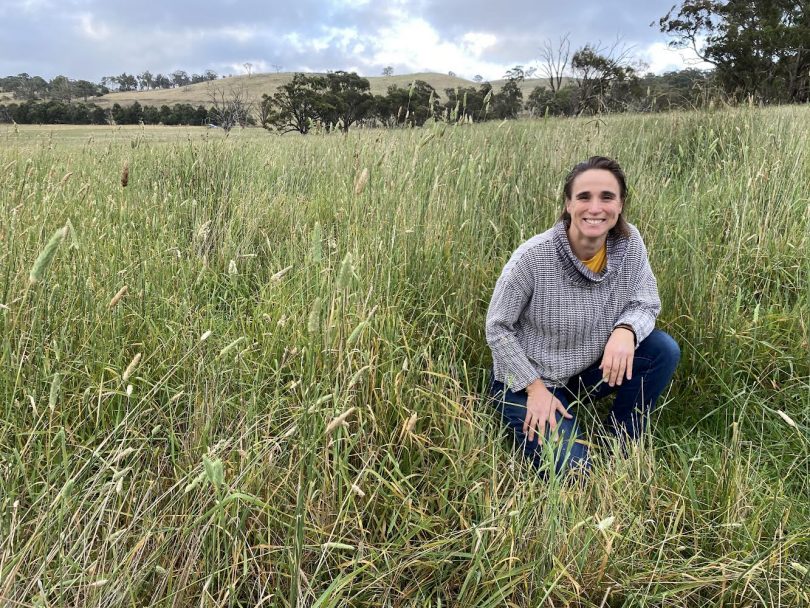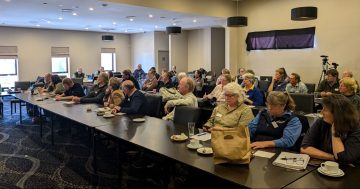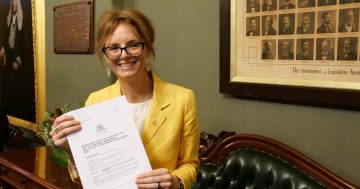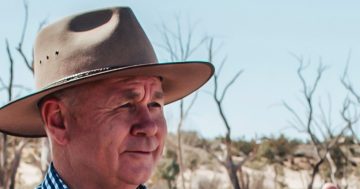
Southern Tablelands farmer Dimity Taylor is benefiting from regenerative agriculture practices. Photo: Supplied.
Around five years ago in the Southern Tablelands region near Crookwell, Dimity Taylor and her husband Hugh Klem joined a local group of like-minded, environmentally-conscious farmers working towards restoring their landscape health.
In the years prior, Dimity and Hugh had taken over the management of the family property at Bannister, where they lived with their three children. At their farm, they grazed sheep and, more recently, started implementing various regenerative farming practices.
“We started right at the beginning of the drought and found the Upper Lachlan Landcare Grazing Group soon after that,” Dimity says.
This journey into regenerative agriculture has been shared by a group of graziers in the Upper Lachlan Shire who are supporting and empowering other farmers to implement regenerative practices to improve their farm profitability and the environment.
In the Upper Lachlan Shire, the largest industry is agriculture with livestock grazing occupying most of the productive land.
It was in 2016 after some farmers had watched a continual decline in landscape health that they became interested in changing grazing practices to ensure a sustainable agricultural future.
They started the Grazing Group to support each other in taking a different approach to farming as a means to transform grazing to achieve healthier and more sustainable landscapes.
Since the group started meeting in 2016, nearly a hundred members have joined.
“People are seeing the benefits of it; economically, emotionally and environmentally,” Dimity says.
“There’s a real mix of people; from small hobby type farms to really big, financially very viable properties and everything in between. People who are quite young and new to farming, people who have been in it for ages and are considering some different approaches.”
More recently, they have been recognised for their contribution as an outstanding community group that is improving sustainable land use and have been nominated as finalists for the Community Group Award in the Australian Community Media (ACM) NSW Landcare Awards.
“I find it so essential to have a big group of like-minded farmers that you can bounce ideas off to help grow your ideas and expand your practices,” Dimity says.
“We knew it would be really important to have a community of other people who are thinking about regenerative farming; to be around them to be able to help us continue in and to progress in what we are doing.
“It’s not about trying to be prescriptive, it’s not about trying to advocate for a particular way of farming, it’s just about trying to challenge people.”
For Dimity and Hugh, adopting some of the regenerative farming practices is helping to improve the health of their land.
“We are just seeing so much more ground cover, a lot more diversity in grass species emerging, so much more microbial activity in the soil, greater water infiltration into the soil,” Dimity says.
In the years after they joined the group, between 2017 and 2019, the region was hit hardest by the drought. Pastures that had supported mobs of cattle and sheep were depleting and graziers faced tough decisions about de-stocking their properties.
It was during the toughest years when the group were able to bring together the community and support each other as well as successfully implement strategies to reduce the severity and duration of drought conditions.
These days the group meet to connect and discuss topical themes, host guest speakers and training workshops, organise bus trips and conduct on-farm visits; all focused on better grazing outcomes.
The group is up for the award alongside Mulgoa Valley Landcare, nominated for restoring the health of the Mulgoa Creek over 26 years, and; Upper Mooki Landcare recognised for their contribution to educational and networking opportunities.
The awards ceremony will be held online on 17 March after the NSW Landcare and Local Land Services conference from 6 pm to 8 pm.
It is free to register for the event, for more information visit nswlandcareconference.com.au











